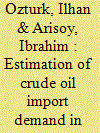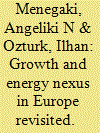|
|
|
Sort Order |
|
|
|
Items / Page
|
|
|
|
|
|
|
| Srl | Item |
| 1 |
ID:
097342


|
|
|
|
|
| Publication |
2010.
|
| Summary/Abstract |
This paper uses the panel data of energy consumption (EC) and economic growth (GDP) for 51 countries from 1971 to 2005. These countries are divided into three groups: low income group, lower middle income group and upper middle income group countries. Firstly, a relationship between energy consumption and economic growth is investigated by employing Pedroni (1999) panel cointegration method. Secondly, panel causality test is applied to investigate the way of causality between the energy consumption and economic growth. Finally, we test whether there is a strong or weak relationship between these variables by using Pedroni (2001) method. The empirical results of this study are as follows: i) Energy consumption and GDP are cointegrated for all three income group countries. ii) The panel causality test results reveal that there is long-run Granger causality running from GDP to EC for low income countries and there is bidirectional causality between EC and GDP for middle income countries. iii) The estimated cointegration factor, ß, is not close to 1. In other words, no strong relation is found between energy consumption and economic growth for all income groups considered in this study. The findings of this study have important policy implications and it shows that this issue still deserves further attention in future research.
|
|
|
|
|
|
|
|
|
|
|
|
|
|
|
|
| 2 |
ID:
149948


|
|
|
|
|
| Summary/Abstract |
The aim of this study is to model crude oil import demand and estimate the price and income elasticities of imported crude oil in Turkey based on a time-varying parameters (TVP) approach with the aim of obtaining accurate and more robust estimates of price and income elasticities. This study employs annual time series data of domestic oil consumption, real GDP, and oil price for the period 1966–2012. The empirical results indicate that both the income and price elasticities are in line with the theoretical expectations. However, the income elasticity is statistically significant while the price elasticity is statistically insignificant. The relatively high value of income elasticity (1.182) from this study suggests that crude oil import in Turkey is more responsive to changes in income level. This result indicates that imported crude oil is a normal good and rising income levels will foster higher consumption of oil based equipments, vehicles and services by economic agents. The estimated income elasticity of 1.182 suggests that imported crude oil consumption grows at a higher rate than income. This in turn reduces oil intensity over time. Therefore, crude oil import during the estimation period is substantially driven by income.
|
|
|
|
|
|
|
|
|
|
|
|
|
|
|
|
| 3 |
ID:
125591


|
|
|
|
|
| Publication |
2013.
|
| Summary/Abstract |
This is an empirical study on the causal relationship between economic growth and energy for 26 European countries in a multivariate panel framework over the period 1975-2009 using a two-way fixed effects model and including greenhouse gas emissions, capital, fossil energy consumption, Herfindahl index (political competition) and number of years the government chief executive stays in office (political stability) as independent variables in the model. Empirical results confirm bidirectional causality between growth and political stability, capital and political stability, capital and fossil energy consumption. Whether political stability favors the implementation of growth or leads to corruption demands further research.
|
|
|
|
|
|
|
|
|
|
|
|
|
|
|
|
| 4 |
ID:
137669


|
|
|
|
|
| Summary/Abstract |
This study investigates the existence of the environmental Kuznets curve (EKC) hypothesis in Vietnam during the period 1981–2011. To realize the goals of this study, a pollution model was established applying the Autoregressive Distributed Lag (ARDL) methodology. The results revealed that the pollution haven hypothesis does exist in Vietnam because capital increases pollution. In addition, imports also increase pollution which indicates that most of Vietnam's imported products are energy intensive and highly polluted. However, exports have no effect on pollution which indicates that the level of exports is not significant enough to affect pollution. Moreover, fossil fuel energy consumption increases pollution while renewable energy consumption has no significant effect in reducing pollution. Furthermore, labor force reduces pollution since most of Vietnam's labor force is in the agricultural and services sectors which are less energy intensive than the industrial sector. Based on the obtained results, the EKC hypothesis does not exist because the relationship between GDP and pollution is positive in both the short and long run.
|
|
|
|
|
|
|
|
|
|
|
|
|
|
|
|
| 5 |
ID:
093505


|
|
|
|
|
| Publication |
2010.
|
| Summary/Abstract |
This paper provides a survey of the recent progress in the literature of energy consumption-economic growth and electricity consumption-economic growth causality nexus. The survey highlights that most empirical studies focus on either testing the role of energy (electricity) in stimulating economic growth or examining the direction of causality between these two variables. Although the positive role of energy on growth has become a stylized fact, there are some methodological reservations about the results from these empirical studies. A general observation from these studies is that the literature produced conflicting results and there is no consensus neither on the existence nor on the direction of causality between energy consumption (electricity consumption) and economic growth. As a policy implication, to avoid from conflicting and unreliable results, the authors may use the autoregressive distributed lags bounds test, two-regime threshold co-integration models, panel data approach and multivariate models including new variables (such as: real gross fixed capital formation, labor force, carbon dioxide emissions, population, exchange rates, interest rates, etc.). Thus, the authors should focus more on the new approaches and perspectives rather than by employing usual methods based on a set of common variables for different countries and different intervals of time.
|
|
|
|
|
|
|
|
|
|
|
|
|
|
|
|
|
|
|
|
|